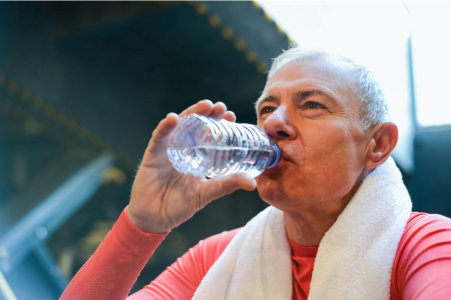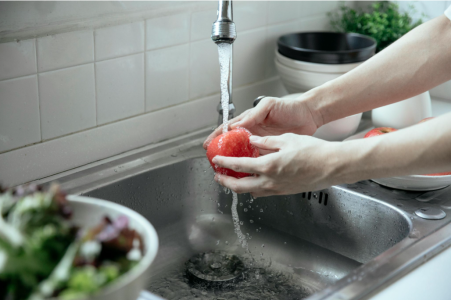New study reveals surprising truth about tap versus bottled water
By
Aubrey Razon
- Replies 0
We all rely on water, but how often do we think about its purity? New scientific findings are raising important questions about the safety of tap versus bottled water.
Which one is really safer for you?
Americans have a thirst for bottled water, consuming a staggering 15 billion gallons annually.
That's about 45 gallons per person each year, according to the International Bottled Water Association.
The convenience and perceived purity of bottled water have made it a staple in many households.
However, recent studies have cast a shadow over its safety.

A comprehensive review last year revealed a startling fact: up to 75% of bottled water contains microplastics.
These tiny particles, which shed from the packaging, find their way into our bloodstream and accumulate in our organs.
The potential damage they could cause is still being understood, but the implications are concerning.
Microplastics have been linked to hormone disruptions, infertility, and even cancer.
A study in BMJ Global Health reported that bottled water could contain between 10 and 78 percent microplastics, along with contaminants like phthalates and bisphenol A (BPA).
These substances are notorious for their adverse health effects, including hormonal imbalances and increased cancer risk.
The National Institutes of Health (NIH) found that water bottles can leach over 200,000 microplastic fragments per liter into the water we drink.
This revelation has led many researchers to advocate for tap water, which they claim is generally safer, better regulated, and contains fewer microplastics than bottled varieties.

Tap water in the United States is under the watchful eye of the Environmental Protection Agency (EPA), which enforces the Safe Water Drinking Act.
This legislation mandates public water systems to monitor water quality and provide reports on their findings, including potential contaminants
In contrast, bottled water is regulated by the FDA as a food product, and while it is tested for bacteria and synthetic materials, this testing is less frequent.
Despite the rigorous standards for tap water, it's not without its own concerns.
Research has uncovered the presence of “forever chemicals” in nearly half of US drinking water samples.
Known formally as per- and polyfluoroalkyl substances (PFAS), these chemicals are persistent in the environment and accumulate in the human body, leading to serious health conditions like cancer, thyroid disease, and high cholesterol.
A recent report by the nonprofit Silent Spring Institute examined over 4,800 water sources and found detectable levels of PFAS in 27 percent of them, affecting 97 million Americans.
Another study from 2023 found PFAS in about 45 percent of US drinking water samples.
Given the risks associated with both tap and bottled water, what can you do to ensure the water you're drinking is as safe as possible?
Experts like John Rumpler, clean water director and senior attorney for Environment America, recommend using water filters to remove potential contaminants.
Filters can be a simple and effective way to reduce the presence of harmful substances in your tap water.
In some situations, bottled water may still be the safer choice, particularly in areas with known unsafe drinking water, during natural disasters, water emergencies, or when contamination is suspected.
However, for everyday use, filtered tap water is often the best option for both health and environmental reasons.
As we navigate the complexities of modern living, it's essential to stay informed about the choices we make, especially when it comes to our health.
The debate between tap and bottled water is more than just a matter of taste—it's a matter of safety.
Remember, the water we drink is the foundation of our health. Let's make every sip count!
 Have you switched to filtered tap water, or do you still prefer bottled? Do you have any tips for ensuring the water you drink is safe? Share your thoughts and experiences in the comments below.
Have you switched to filtered tap water, or do you still prefer bottled? Do you have any tips for ensuring the water you drink is safe? Share your thoughts and experiences in the comments below.
Which one is really safer for you?
Americans have a thirst for bottled water, consuming a staggering 15 billion gallons annually.
That's about 45 gallons per person each year, according to the International Bottled Water Association.
The convenience and perceived purity of bottled water have made it a staple in many households.
However, recent studies have cast a shadow over its safety.

Studies have shown that bottled water may contain harmful microplastics. Image source: Kampus Production/Pexels.
A comprehensive review last year revealed a startling fact: up to 75% of bottled water contains microplastics.
These tiny particles, which shed from the packaging, find their way into our bloodstream and accumulate in our organs.
The potential damage they could cause is still being understood, but the implications are concerning.
Microplastics have been linked to hormone disruptions, infertility, and even cancer.
A study in BMJ Global Health reported that bottled water could contain between 10 and 78 percent microplastics, along with contaminants like phthalates and bisphenol A (BPA).
These substances are notorious for their adverse health effects, including hormonal imbalances and increased cancer risk.
The National Institutes of Health (NIH) found that water bottles can leach over 200,000 microplastic fragments per liter into the water we drink.
This revelation has led many researchers to advocate for tap water, which they claim is generally safer, better regulated, and contains fewer microplastics than bottled varieties.

Tap water is strictly regulated by the Environmental Protection Agency (EPA) whereas bottled water. Image source: Miriam Alonso/Pexels.
Tap water in the United States is under the watchful eye of the Environmental Protection Agency (EPA), which enforces the Safe Water Drinking Act.
This legislation mandates public water systems to monitor water quality and provide reports on their findings, including potential contaminants
In contrast, bottled water is regulated by the FDA as a food product, and while it is tested for bacteria and synthetic materials, this testing is less frequent.
Despite the rigorous standards for tap water, it's not without its own concerns.
Research has uncovered the presence of “forever chemicals” in nearly half of US drinking water samples.
Known formally as per- and polyfluoroalkyl substances (PFAS), these chemicals are persistent in the environment and accumulate in the human body, leading to serious health conditions like cancer, thyroid disease, and high cholesterol.
Another study from 2023 found PFAS in about 45 percent of US drinking water samples.
Given the risks associated with both tap and bottled water, what can you do to ensure the water you're drinking is as safe as possible?
Experts like John Rumpler, clean water director and senior attorney for Environment America, recommend using water filters to remove potential contaminants.
Filters can be a simple and effective way to reduce the presence of harmful substances in your tap water.
In some situations, bottled water may still be the safer choice, particularly in areas with known unsafe drinking water, during natural disasters, water emergencies, or when contamination is suspected.
However, for everyday use, filtered tap water is often the best option for both health and environmental reasons.
As we navigate the complexities of modern living, it's essential to stay informed about the choices we make, especially when it comes to our health.
The debate between tap and bottled water is more than just a matter of taste—it's a matter of safety.
Remember, the water we drink is the foundation of our health. Let's make every sip count!
Key Takeaways
- Studies have shown that bottled water may contain harmful microplastics, leading researchers to conclude that tap water is generally safer and more eco-friendly.
- Despite the safety of tap water, research has found that nearly half of US drinking water samples contain “forever chemicals” like PFAS, linked to cancer and other health issues.
- Tap water is strictly regulated by the Environmental Protection Agency (EPA) whereas bottled water is regulated by the Food and Drug Administration (FDA) with fewer standards and less frequent testing.
- Experts recommend using water filters to remove potential contaminants and suggest that bottled water may still be safer than tap water in places with known water contamination issues.






